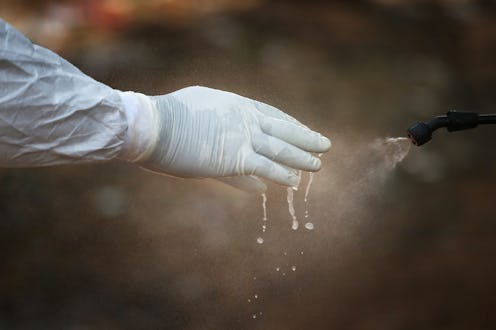News
Here's How Hard It Is To Catch Ebola
Shh. Hear that? That's the sound of the Ebola hysteria dying down. While we continue to settle back into being afraid of gun-toting right-wing extremists and puppy-sized spiders, here's a definitive, once-and-for-all, detailed guide to ways you could catch Ebola, which just goes to show how difficult it is to contract the disease. For further emphasis, we're going to get a little graphic with example scenarios, but if these descriptive aids make you think, "Man, that's horrible," then it's probably a sign that you haven't done something that would expose you to Ebola. You're welcome.
Ebola is a virus disease transmitted through the bodily fluids of those infected. Even when one contracts Ebola, they're only contagious when they are symptomatic. Those symptoms primarily include fever, muscle and joint pain, sore throat, headache, abdominal pain, weakness, vomiting, diarrhea, and unexplained hemorrhaging. The incubation period (the time symptoms start to show) is between two and 21 days, but symptoms usually show between five and seven days.
If the patient is exhibiting symptoms, their bodily fluid would have to come in contact with an open cut or the mucous membrane (mouth, eyes, nose, vagina) of another in order to infect them. The virus is actually very fragile, and can be easily killed with soap, disinfectants, and heat (yet another reminder to always wash your hands).
Without further ado, here is exactly what you'd have to do to contract Ebola. So if you haven't done any of the following in your life, and you don't plan on doing any of it, congrats. You won't get Ebola.
Put a Band-Aid On It
Have you recently hung out in a city with confirmed cases of Ebola with open wounds exposed? No? You probably don't have Ebola. If the answer is yes, did you happen to touch anyone who was exhibiting symptoms? No? Phew, then you're good. If you did? OK, did you let them vomit, bleed, urinate, defecate, or ejaculate on you?
No? Great. If the answer to that one is yes, then it's possible. But still improbable. The lesson here: If you have a cut, simply cover it up with a bandage.
Stop Touching Yourself
OK, so you don't have any cuts or open sores. That's a good start. But if you happen to come in contact with an Ebola patient, here are a list of things you shouldn't do:
- Touch the patient and/or their bodily fluids and then lick your fingers.
- Touch the patient and/or their bodily fluids and then rub your eyes.
- Touch the patient and/or their bodily fluids and immediately pick your nose.
- Touch the patient and/or their bodily fluids and then sneak off somewhere to... take care of yourself.
If you've never done any of the above, you don't have Ebola.
Other Things Not to Do
Touching Ebola-contaminated bodily fluids and then touching yourself isn't the only way to get Ebola. Luckily, the rest of the infection methods are also pretty specific.
- Shared a bowl of Pho with someone who has Ebola — or any food, really.
- Made out with someone who has Ebola (heavy petting optional).
- Had sexual intercourse with someone with Ebola.
- Continued to have sexual intercourse with someone who recovered from Ebola — important note: the Ebola virus can live in semen for up to 90 days after a patient becomes symptomatic.
Chances are, you won't be risking these activities with someone who has Ebola, because almost nobody in the United States has Ebola (and those who do are in incredibly strict isolation).
Now's Not the Time For the Raw Movement
We're not judging your trendy diet, but if you've eaten a raw West African bat infected with Ebola recently, you may start to show symptoms any day now. Sorry. Same goes for any raw animal meat contaminated with the disease. But good news for the 99.9 percent of the world who has not done that recently — you don't have Ebola! Or, if you happen to enjoy your bushmeat cooked, you're also Ebola-free.
Images: Getty Images (4)
